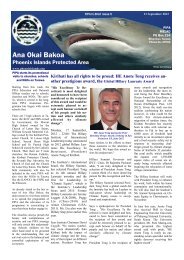Nomination for a World Heritage Site 2009 - Phoenix Islands ...
Nomination for a World Heritage Site 2009 - Phoenix Islands ...
Nomination for a World Heritage Site 2009 - Phoenix Islands ...
Create successful ePaper yourself
Turn your PDF publications into a flip-book with our unique Google optimized e-Paper software.
No previous resource surveys have been identified <strong>for</strong> Carondelet or Winslow reefs, or <strong>for</strong><br />
the unnamed reefs in the <strong>Phoenix</strong> <strong>Islands</strong>. A survey was attempted at Winslow in August<br />
2008 but the reef could not be located (Jim Maragos, US Fish and Wildlife Service, oral<br />
in<strong>for</strong>mation). These remote untouched reefs undoubtedly have high species diversity and<br />
populations of endangered species. The draft management plan has an objective to complete<br />
baseline surveys of the reefs of Carondelet and Winslow and of other unnamed reefs in the<br />
<strong>Phoenix</strong> <strong>Islands</strong> using standardized quantitative methods. The <strong>2009</strong> expedition by New<br />
England Aquarium is expected to provide more in<strong>for</strong>mation on these reefs. Establishing notake<br />
zones around Carondelet and Winslow Reefs is <strong>for</strong>eseen in the new management plan.<br />
More in<strong>for</strong>mation on the ecology of seamounts is provided later in this nomination in the<br />
chapter on Seamounts.<br />
Oceanography<br />
Sea surface temperatures within PIPA are normally between 28-30°C. There is no significant<br />
thermocline down to 50 m depth. Sea level observations on Kanton show regular four-day<br />
oscillations related to equatorial waves. Oceanographic studies reveal that silicate and<br />
phosphate levels in the waters around the <strong>Phoenix</strong> <strong>Islands</strong> are elevated compared adjacent<br />
waters. This may be a result of upwelling and have high importance <strong>for</strong> the pelagic food<br />
chain in the region. For example in 2000, McKean water temperature was slightly cooler than<br />
that of Nikumaroro. This suggested up-welling and mixing of deeper water on McKean. The<br />
minimum water temperature recorded was 26.7 0 C at Nikumaroro (Obura and Stone 2003).<br />
The <strong>Phoenix</strong> <strong>Islands</strong> are adjacent to the equator and are predominantly influenced by the<br />
westward-flowing Equatorial Current (northern equatorial branch of the South Equatorial<br />
Current (BEN) and south equatorial branch of the South Equatorial Current (BES) (TBAP<br />
1993). Offshore currents are generally westward. The strength of the currents varies with the<br />
wind. Usual current speed is 1.9 km per hour (1 knot), with a maximum of 3.7 km per hour (2<br />
knots).<br />
The <strong>Phoenix</strong> <strong>Islands</strong> are subject to the ENSO that occurs every two to seven years and lasts<br />
<strong>for</strong> 18 to 24 months. During ENSO events, the westward trade winds are reduced and the<br />
main water currents experience variations and even reversal. This deepens the eastern Pacific<br />
thermocline. More specifically, the <strong>Phoenix</strong> <strong>Islands</strong> are located within the region of the<br />
Central Pacific in which warm pool of surface waters develops at the onset of El Niño phases,<br />
and can experience persistent hotspots lasting 1 year or more, as occurred in 2002-3. This<br />
unique environment of high exposure to warm water pools may exert unusual selective<br />
pressures on marine organisms relevant to climate change adaptation, discussed further in<br />
later sections.<br />
The Tuna and Billfish Assessment Programme (TBAP 1993) provided diagrams (some<br />
shown below) of the seasonal changes in major equatorial surface currents around the<br />
<strong>Phoenix</strong> <strong>Islands</strong>.<br />
33





